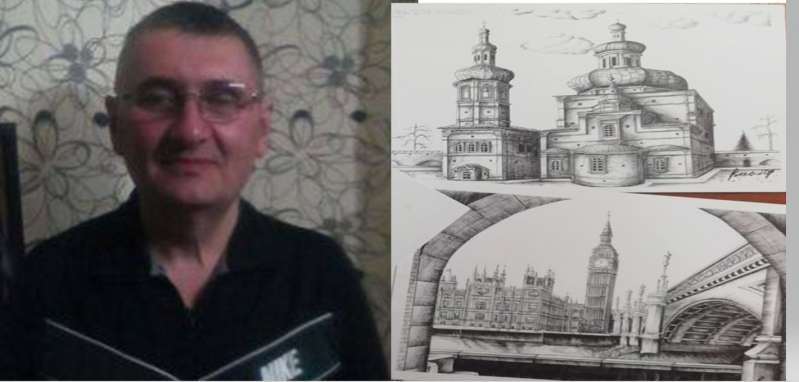Viktor Shur: 6 years in Russian captivity for a photo of cows in a disused aerodrome

Viktor Shur turned 63 on 10 March, his sixth birthday in Russian imprisonment. Shur is one of the oldest of the Kremlin’s political prisoners, held in conditions that are gruelling for men decades younger. His daughter, Olha, reports that his health has gravely deteriorated, especially after the particularly bad conditions in ‘SHIZO’ or punishment cells. As well as bronchitis and a bone-related condition which may be causing his severe headaches, Shur also reports a severe deterioration in his eyesight. His artwork is obviously one of the only joys he has, so this is serious.
Shur’s hopes now are pinned solely on being part of the next exchange of prisoners, although it is essentially Russia who dictates whom it will release.
Shur is the son of a well-known Chernihiv art collector, and was himself involved in business, with this entailing regular travel between Ukraine and Russia. It was for this reason that when the Soviet Union collapsed in 1991 he opted for Russian citizenship, while having permanent resident status in Ukraine. His family is Ukrainian and he himself now holds Ukrainian citizenship, received when he was already imprisoned. Shur’s wife died several years ago, and he was living in Chernihiv, helping his elderly father. He had supported Euromaidan, and later helped Chernihiv volunteers.
Shur is one of several Ukrainians who, since the beginning of Russia’s aggression against Ukraine, have been arrested and sentenced to long terms of imprisonment on mystery ‘spying’ charges The suspicion that Russia’s FSB first seizes a Ukrainian and then decides what to charge him with seems confirmed in Shur’s case by initial lack of any clarity as to the charges against him.
In December 2014, Shur received a phone call from a client and arranged to drive to the Bryansk oblast (across the border from Ukraine). He was supposed to return immediately, but simply disappeared. The family began searching but it was only after a week that Shur phoned and said that he had been arrested for fighting with a policeman and that he would return in another week.
The family were then told that he had been arrested for infringing the rules for a state-guarded site, with that subsequently stepped up to a charge under Article 275 of Russia’s criminal code with state treason and collaboration with the security services of a foreign state.
The family much later ascertained that he had been seized in the zone between the Ukrainian and Russian borders by men in masks who broke the windows in the car and used smoke bombs against him.
Such methods may be appropriate when trying to catch a dangerous criminal, but the FSB appears to have accused him of having photographed a field. The field in question was, seemingly, once a defence ministry aerodrome, although Shur had not known this. Locals are also, seemingly, unaware that this is some kind of ‘strategic site’ since their cows graze on the grass growing there.
‘Spying’ or ‘treason’ charges are extremely convenient for the FSB, since the trials can be held in total secrecy. In most, if not all, such cases against Ukrainians, the men have been held incommunicado and without access to real lawyers.
Shur was initially held in the Bryansk SIZO [remand prison] and then taken to the FSB’s Lefortovo prison in Moscow.
Olha reports that the so-called investigators used psychotropic drugs to get information out of her father, and it is likely that other forms of torture were also applied. During all her visits to the prison, a guard is present and Shur would certainly be stopped and then face reprisals if he was to talk about the treatment he had received.
There are other standard FSB methods, including threats and promises that a ‘confession’ will minimize the sentence.
If he was given such an assurance, he was brutally deceived. Having signed whatever documents were placed in front of him, Shur was sentenced on 7 October, 2015 by the Bryansk Regional Court to 12 years’ maximum security imprisonment. The court website reported that he had been found guilty of state treason in the form of espionage. He was supposed to have “on 9 December 2014 carried out reconnaissance activities on the territory of the Bryansk oblast – he gathered information constituting a state secret about a protected site belonging to Russia’s defence ministry with this ordered by Ukrainian State Border Service. Were this information to be handed to Ukraine’s Security Service, the latter could have used it against Russia’s security”.
This was a closed court hearing, and Shur had never had access to any lawyer who did more than sign documents, except, perhaps, advising him to ‘confess’. Russia has used punishment cells to restrict Shur’s access to the Ukrainian consul, almost certainly because it has a great deal to conceal in this case.
PLEASE WRITE TO VIKTOR SHUR
It is very important to him to know that Ukraine and people beyond are concerned about him, and any letters or cards also send an important message to Moscow that he is not forgotten.
The messages need to be in Russian. If this is difficult, the following can be cut and pasted.
Здравствуйте!
Желаю Вам здоровья, мужества и терпения, надеюсь на скорое освобождение.
Мы о Вас помним.
[Hello, I wish you good health, courage and patience and hope that you will soon be released. You are not forgotten.
Address
241021, Bryansk, 30 Komarova St., Prison Colony No. 1,
Shur Viktor Valentinovich (born 1957),





